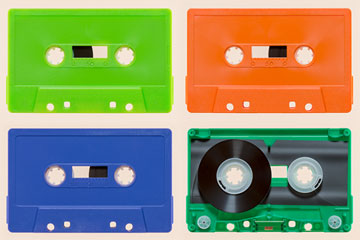
(2 of 2)
Evidence of the cassette craze is everywhere. New tape-focused labels have launched in the past few years, and larger labels are getting in on it too, with cassette releases this spring from She & Him and MGMT. Filmmakers Seth Smoot and Zack Taylor crowdfunded a documentary about tapes called Cassette, now nearly complete. They imagined the film as a eulogy, but before long they realized the story was about longevity, not death.
One reason for that endurance is people like Mark Bijasa, a collector in Cerritos, Calif., who owns about 4,000 tapes. His goal is to have three of each recording: "one to rock, one to stock, one to swap," as he puts it. Bijasa, 33, grew up around tapes, but it's been less than a decade since he began hunting them down. He has a cassette-centric Instagram account with 6,000 followers, and as a graphic designer he creates J-cards (the cardboard inserts that go in tape cases) for record labels. He may even be spreading the gospel a bit too well. Rarities can now go for hundreds of dollars on eBay, pricing him out, and he says cassette aisles at record stores are often picked over before he gets there.
Then there's the mixtape. Mixes changed music history, says Rob Sheffield, author of Love Is a Mix Tape. "The way that mixtapes became a cultural institution really influenced the way we listen to music today," he says. "With a great deal of discouragement from the official music-world establishment, the audience invented this way to share music."
After all, what is a playlist if not a glorified mixtape, shared on Spotify or carried on an iPod? Tapes took music from labels and gave it to listeners, heralding a change in the very meaning of entertainment. That change has no rewind button. The world won't go back to listening to songs on an album in the sequence picked by a band, just as the news isn't read in the order a paper chooses and a TV show isn't watched at the hour it's broadcast. Mixtape culture thrives even among those for whom the cassette revival is out of earshot.
Like, ironically enough, Lou Ottens. Even though he invented the cassette, Ottens listens to most of his music on CD. (Then again, during the 1970s, he spearheaded the invention of those too.) He feels no nostalgia for the old format, preferring to look forward rather than back. "The cassette is history," he says. "I like when something new comes."
